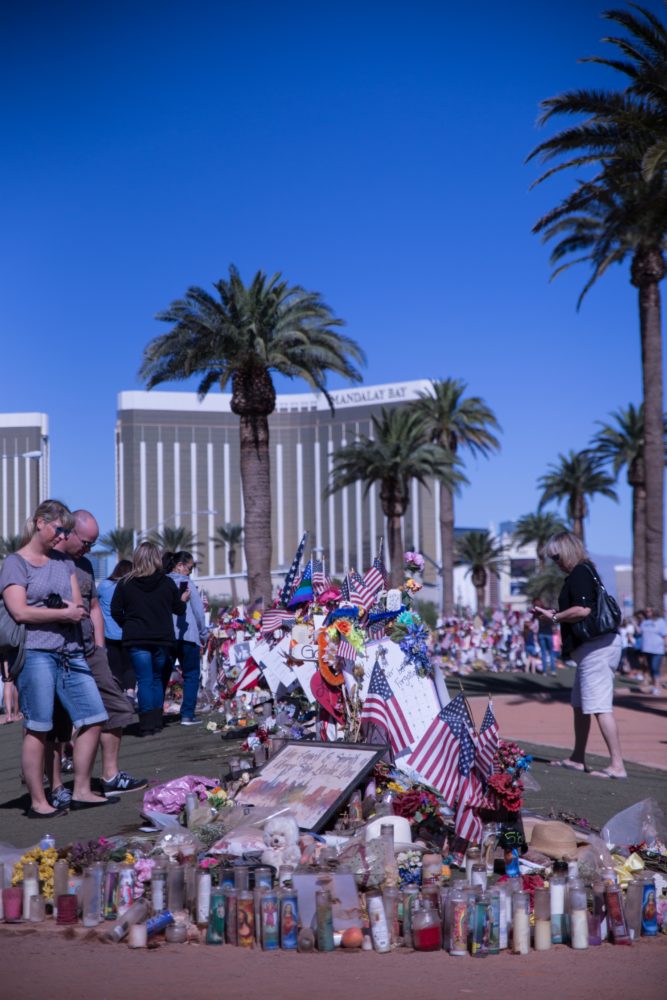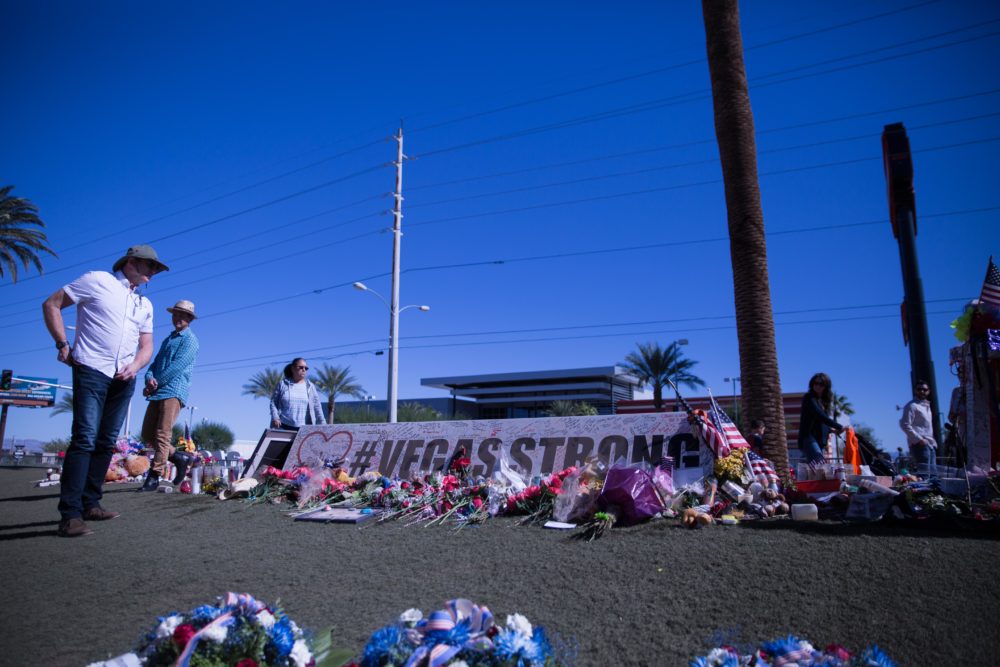One month later: Life after Mandalay Bay
When President Donald Trump visited Las Vegas after the mass shooting last month, Stephanie Melanson was invited to meet with him and tell her story. She was OK until the clicking of cameras clicking sent her back to that night of gunshots.
Stephanie Melanson, along with her sister, Paige, and her mother, Rosemarie, were at the Route 91 Harvest music festival when Stephen Paddock shot and killed 58 people and injured 546 people from the 32nd floor of the Mandalay Bay Hotel.
Among the injured were Paige, who had a bullet graze her elbow, and Rosemarie, who was shot in the chest and is still in critical condition, said Tasha Killian, a close friend of the family and an alumna of Utah State University.
With the Melanson family’s permission, Killian shared their story with The Utah Statesman.
The doctors said Rosemarie will recover, but the bullet shattered and left fragments that tore holes in different organs, Killian said.
“I used to call her Mom Melanson, because she’s just everybody’s mom,” she said. “You go over to their house and she always has treats for you. She always made sure you’re doing just fine and everything’s going well in your life. She was just a mom to everyone she knew and everyone that came over to her house.”

A memorial for the victims of the Mandalay Bay concert shooting located at the entrance of the Las Vegas Strip. (Kyle Todecheene)
Melanson had gotten tickets to go to the concert as a Mother’s Day gift from her two daughters, Paige and Stephanie, Killian said.
She was injured during the first round of shots and fell to the ground. Her daughters didn’t want to leave her but it was too dangerous. Through the crowd, a retired firefighter from California came to help and told Melanson’s daughters to run away, promising them he would stay with their mother until she was safe.
“And so, with that promise, they ran out and were able to get to safety,” Killian said.
It took 11 hours for Paige and Stephanie to find their mother again, she said. They went from hospital to hospital trying to find her, but kept getting turned away as more and more patients were brought in.
A couple of days later, Killian said, the girls found the firefighter who had helped them and were able to thank him.
“I think it was a good healing process for the two girls to be able to meet him and talk to him and hear the rest of the story,” she said.
After her daughters ran to safety, the firefighter used a sweater from one of the girls to stop their mother’s bleeding. Some of the people around him broke down a fence and used it to carry Rosemarie to an ambulance.
Killian said he was glad to hear she made it somewhere and was being taken care of.
One month later, the Melanson family is still recovering. It’s still on a day-to-day basis, Killian said.
Despite the impact that the shooting had on those who were there that night as well as their friends and family, Las Vegas has pretty much returned to normal, said Melissa Bowles-Terry, a USU alumni and UNLV faculty member.
“In a lot of ways it feels like we sort of hosted this tragedy,” she said, “because so many of the victims and so many of the people who were there were not local per se.”
Instead, it feels like they were the center of the shooting, but the results are dispersed throughout the country, she said. Las Vegas is a tourist town and it affected a lot of tourists.

A memorial for the victims of the Mandalay Bay concert shooting located at the entrance of the Las Vegas Strip. (Kyle Todecheene)
Killian had four or five friends at the concert that night, both local and visiting. Her brother was also on The Strip for a hockey game at the time of the shooting.
She had just returned home to Provo after a weekend in Idaho with friends and was scrolling through Facebook when she heard the news.
It was 1 a.m. on her birthday.
“I just couldn’t even sleep,” Killian said. “I was up till like three in the morning just going through the different people I knew were there, going through my Facebook feed, getting all the notifications of people saying they were safe.”
Despite its close proximity, the University of Nevada Las Vegas decided to stay open the day after the shooting.
“We just went about kind of on autopilot basically, just went about my day as usual,” said Michael Terry, also a USU alumni and UNLV faculty member.
The rationale behind staying open, Terry said, was to give students a space to process things and check in. Some professors carried on class as usual, but others either cancelled class or used their time to discuss the shooting.
“I just couldn’t have a normal class,” Terry said. “I mean that just wasn’t going to work, so I held my class and I think everyone was just in shock about what happened. “
Terry spent the first few minutes of his class discussing the material he had planned, and then spent the rest of the time talking about resources available for everyone. After 20 minutes, he ended the class, then wandered around. Campus was really empty that day, he said.
The UNLV provost asked professors to be understanding with students who weren’t in class that week, he said. A lot of people disagreed with the decision to have school that day.
“I think these kind of things happen all the time, in the United states overall,” he said. “And I think a lot of people are affected by that, like any time it happens in the country. When it happens this close, in a town in the city you live in, it feels more real in some ways, like it’s even that much more obvious that we have a problem.”
Bowels-Terry agreed.
“And it has really, you know, pointed out to me again that we need gun reform in this country so that a person can’t amount a whole collection of 30 automatic weapons. It’s really dangerous, the fact that a person can do that without any oversight,” she said.
After everything that happened, Killian said the city of Las Vegas triggers a different feeling within her.

A memorial for the victims of the Mandalay Bay concert shooting located at the entrance of the Las Vegas Strip. (Kyle Todecheene)
“It’s still home,” she said. “It’s still Las Vegas and ‘what happens in Vegas stays in Vegas’ and it’s still got that party feel to it and I don’t think there’s anything that will keep me from going and just enjoying that environment, but it definitely has a different meaning to it.”
For her, that feeling is pride in the way that the Las Vegas community came together after the shooting.
“To know that something terrible happened in your hometown and to feel the effects of that with the people close to you,” she said, “but then also to feel proud of the way that people reacted to it and that complete strangers became heroes and changed people’s lives and gave their life for someone else that they didn’t even know.”
She continued.
“I don’t really know how to describe it other than, it felt more like home than it has in a really long time. And I was really proud to say that I was from Las Vegas,” she said.
– Miranda.lorenc@gmail.com
@miranda_lorenc

